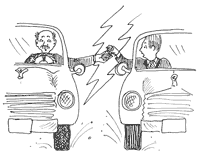STRANGE BUT TRUE- Drive-by: Don't reach out and touch someone

DRAWING BY DEBORAH DERR McCLINTOCK
Q. When might the simple act of reaching out and handing a package of gum to another person get both of you killed fast? Don't try this! –E. Ford
A. In a classic 1953 story, a professor was driving slowly when two friends pulled up alongside, matching his
speed, says Jearl Walker in The Flying Circus of Physics. The friend in the passenger side reached out to hand a package of gum to the professor. But when the two hands got within an inch or two of touching, a terrific discharge occurred between them that was momentarily disabling. "Luckily, the professor did not veer into the second car before he could regain his senses and the control of his car," Walker writes.
The spark occurred because the motion of the cars electrically charged the professor and the friend by different amounts, possibly even with one charge being positive and the other negative. "When the two hands were close enough, electrons from one jumped across the air gap to the other, reducing the charge difference"– and zap!
Q. Imagine all the world's people standing one in front of another in lines a mile long, and with lines shoulder to shoulder stretching a mile wide. The people left over would have to stand on the shoulders of those below, forming a gigantic human "block." Puzzle: How high would the block need to be to squeeze in all of the world's 6+ billion population? A) 1 mile B) 10 miles C) 100 miles D) 1,000 miles? –J. Lennon
A. Surprisingly, A. Figure that there are 150 billion cubic feet in a cubic mile (5,280 x 5,280 x 5,280), which when divided by 6.4 billion = 23 cubic feet per person– "enough for all of us to squeeze in," with ample breathing room left over, say Edward Burger and Michael Starbird in Coincidences, Chaos, and All That Math Jazz.
Q. Wow, a Roman numerals equation, but it's not correct: No way that 11 + 1 = 10. Without using a pencil, how might you fix it? You'll flip at how easy this is. XI + I = X –J. Brinkley
A. At least three fixes here: (1) Rotate the page through 180 degrees (2) View the page right side up but reflected in a mirror (3) If the page is at least partly translucent, turn it over and view the equation through the rear side. (From A Beginner's Guide to Immortality by Clifford Pickover)
Q. Why the powerful appeal of "monkey see, monkey do" for us humans? –D. Fossey
A. Credit "mirror neurons" that fire every time you make a move, like opening a can of soda, says Ingfei Chen in Discover. Remarkably, these same frontal lobe neurons fire if you just see or hear another person open the can or munch potato chips! That's what makes empathy such a fundamental human capacity– because it's at the neurological level, says Christian Keysers.
In fact, the stronger people's neurons flash in response to sound cues, the higher they score on questionnaires testing their ability to put themselves in another person's shoes. Thus "monkey see, monkey do" becomes "see the monkey, feel for the monkey." And in a rather startling study, PET scans revealed a similar mirror-neuron hookup in literal monkeys as well, says psychologist David G. Myers.
These mirror neurons also tie in with the hot topic of "memes," those self-replicating cultural mutations ranging from fashions to cell phones to ideas. Learning by imitation is the social glue here, which is what our monkeying-about species is all about.
Q. I'm 53 and don't understand why I can't remember where I put my keys 15 minutes ago but I can remember every word of the theme from Gilligan's Island. Any ideas? –P. Cantor
A. The problem's not all that mysterious, says Princeton University psychologist Ken Norman. Basic principles of memory will explain it: We all have good recall of the Gilligan's Island song because we were exposed to it repeatedly, paid attention to it (at least some of the time), and because the song is highly meaningful (it tells a coherent story) and structured (melody, repeating chorus, etc).
On the other hand, we all forget where we put our keys because placing them is a single event, we hardly pay attention, today's placement gets easily confused with yesterday's, and in any case has no real meaning to us. Great keys-memory would follow if we placed them the same every day, paid attention as we did so, and made up a little song ("I'm putting my keys on the dresser, da dum dah...") as mnemonic assist.
"But who has the mental energy or inclination to do this?" Norman asks. "And so we lose our keys."
Send Strange questions to brothers Bill and Rich at [email protected].
#